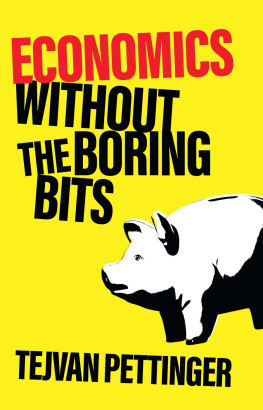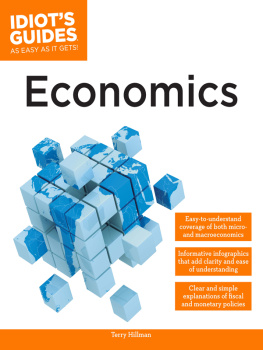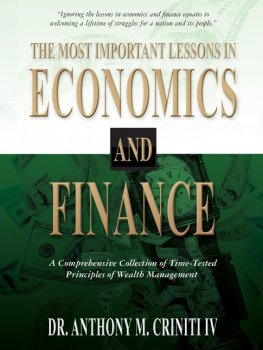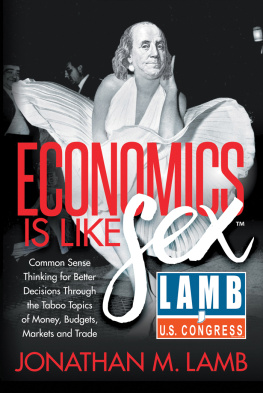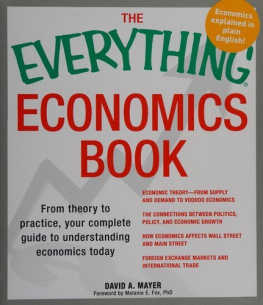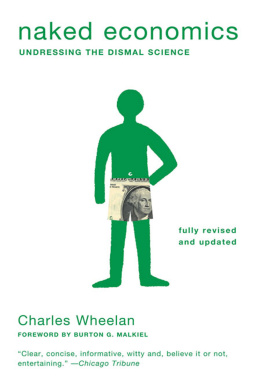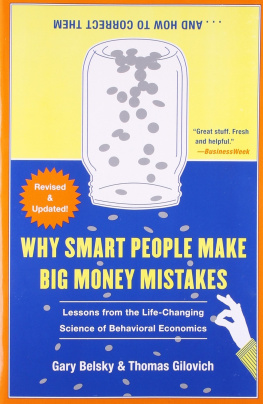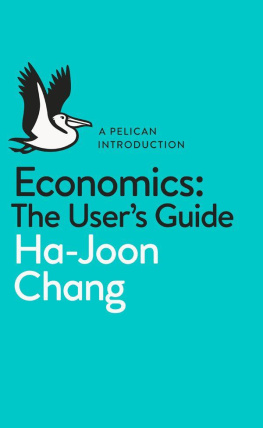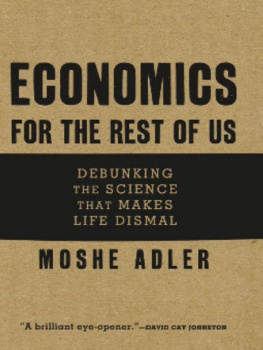To my parents, who dont know much about economics,
but taught me other, more useful things.
CONTENTS
I have been teaching economics for over 20 years, and like many teachers am always trying to find ways to make the subject enticing, interesting and thought-provoking. This involves avoiding the more complicated jargon as much as possible and making the subject relatable to everyday life. Indeed, looking at economics from a practical perspective, and seeing how it affects our friends and family, can really help bring the subject alive.
The aim of this book is to distill some of the most interesting concepts of economics and present them in a way thats accessible for both students and general readers. Even if you have never picked up a copy of the Financial Times or have never fully understood what is meant by inflation targets and fiscal responsibility, hopefully this book will simplify and bring to life many of the seemingly esoteric aspects of economics.
The book is designed so you can dip in and out of the chapters, choosing a topic that interests or intrigues you. But, taken together, the chapters present a brief introduction to all that is fascinating about economics without all those boring bits at the back of the Financial Times!
Tejvan Pettinger
5 March 2021
ECONOMIC ERRORS
LUDDITE FALLACY
I n the early nineteenth century, a group of skilled English textile workers were alarmed by the rise of automated textile machines. To the self-employed artisans working in a small-scale cottage industry, the newfangled machines and large factories threatened their livelihood; they saw these machines as causing them economic hardship. With pitifully poor employment prospects, they decided to fight back and took to physically smashing machines. The revolt of the skilled working class was ruthlessly put down and the Luddites did nothing to stop the relentless spread of large-scale manufacturing and automated processes. It is a development that continues in the modern world. But the fear that new technology causes job losses is just as strong as 200 years ago.
In economics, the Luddite fallacy has come to mean the mistaken belief that new technology takes away jobs and creates unemployment. In essence, new technology may create some disruption in the economy, but the overall level of employment should generally be unaffected.
If we take the example of nineteenth-century England, the new factories and automated spinning machines significantly increased the productivity of the clothing industry. Artisans who used to make clothes by hand were unable to compete, so demand for their labour dried up. Understandably, they felt that the machines were taking away their livelihoods and were therefore the cause of their poverty. To some extent, they were right: the machines were indeed bad news for these skilled artisans, who lost their main source of employment. However, in economics, it is always important to look at the bigger picture and to notice the less visible, second-round effects.
Firstly, the new machines and factories created a new source of employment. Former agricultural labourers were enticed to work in these factories. Although conditions were very bad by todays standards, the manufacturing jobs were more highly paid than previous agricultural labouring jobs. This meant that workers in the mills had greater spending power than when they were working on the farm. Secondly, the more productive process of making clothes meant that the price of clothes began to fall. Buying tailored clothes was once the preserve of the rich, but cheaper cloth and clothes meant more people could afford to buy. As clothes became cheaper, people had more disposable income and could afford a wider variety of goods, and so other firms may have seen an increase in demand. Whats more, the nineteenth century brought the growth of new industries like railways, spectator sports and leisure holidays.
The period also offers us an example of the impact of technology. As new technology is developed, firms become willing to spend more money on research and development, creating new employment in engineering and design. It is true that there is considerable disruption in the process, but in the long term, the economy creates better paid jobs to replace the old ones that are lost. The jobs of skilled artisans are lost, but the more productive process enables new jobs to be created (clothing retail, leisure, making machines). This may be little comfort to those skilled artisans left without income, but it is undeniably true that the average worker is better off than 150 years ago.

New technology doesnt create an increase in unemployment; it merely shifts employment from one sector to another. At the turn of the twentieth century, France employed around 300,000 coal miners; by the early 1970s that had fallen to 150,000. By 2011, there were zero miners employed in France. You can say technology has caused the loss of mining jobs but is that such a bad thing? Now, young people from former mining villages have very different sources of employment.
Having said that, the redistribution process can be painful. It is all very well sitting at a desk and saying that new jobs will be created in the long term but those who lose out to disruptive technology may feel that they do not get any of these so-called gains. The problem is that a coal miner who loses his job may lack skills, qualifications and the geographical mobility to access the new employment sources. We can see that new jobs are created overall, but some workers may lose out for several years. To the unemployed in Michigan, its not much consolation that there are new jobs created in IT in New York and Los Angeles.
Nor is unemployment the only problem. So too is losing the ability to do a profession that gave a sense of pride and satisfaction. A skilled artisan who makes clothes by hand could, in theory, gain a repetitive job in a big factory, but they would lose their sense of job satisfaction. In the US, automated processes are leading to a big fall in manufacturing employment, and the new jobs created are often part-time, temporary, and/or zero-hour contracts. A good manufacturing job working with fellow workers created a sense of pride; working as a part-time pizza delivery driver may feel like a step back. Just because new jobs are created in the long term doesnt mean there are not also significant long-term costs.
The Luddite fallacy fallacy Most people would agree that the actions of the Luddites of the nineteenth century were misplaced (even if we can feel sympathy). No one would like to go back to the living standards of the early 1800s in order to protect the job of making clothes by hand. The new machines of the nineteenth century steam engines, handlooms, electricity led to huge gains in productivity, and any disruption to employment was more than compensated for by the significantly higher output and new, better paid jobs. There may have been a time when we protested the loss of coal mining jobs, but would anyone seriously want an economy based on one million coal miners? If you have travelled two miles down a mine shaft to work in the heat and dark, working in a call centre may not seem so bad.
However, despite all this, it is possible to make the case that in the modern age of hyper-technology and artificial intelligence, the Luddite fallacy may not actually be such a fallacy after all. It might sound a bit of a mouthful but the Luddite fallacy fallacy states that the development of new technology could actually create a worse employment situation for many low-skilled workers.

